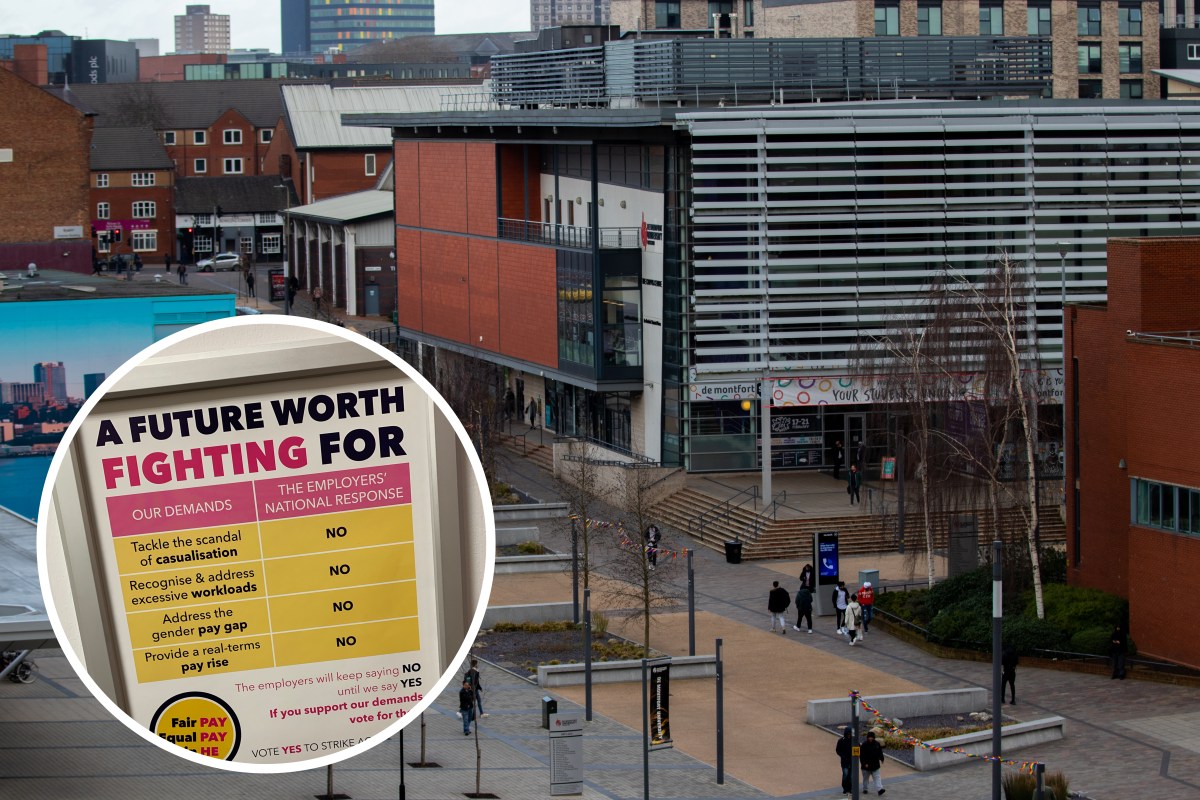By Alexander Hodgkins-Jones
Members of the University and College Union (UCU) at De Montfort University are joining 73 other institutions across the country in taking strike action, beginning on Thursday(FEB20).
A total of 14 days of strikes are scheduled to take place at DMU over five weeks, concluding on Tuesday, March 17.
Many students will be wondering how they will be affected, asking why it has come to this and, with tuition fees at eye-watering levels, thinking about the money lost on cancelled classes.

What is happening?
Staff across 74 universities, including DMU, have voted to strike in February and March.
Members of the UCU at DMU voted in a ballot to join the upcoming action during a meeting on February 6.
This means lecturers will be taking 14 days of unpaid leave, resulting in class cancellations at the end of February and beginning of March.
Strikes are planned on the following dates:
- Week one – Thursday 20 and Friday 21 February
- Week two – No ‘all out’ strike action planned
- Week three – Monday 2 to Friday 6 March
- Week four – Monday 9 to Friday 13 March
- Week five – Monday 16 and Tuesday 17 March
What is a strike?
Strikes occur when trade union members choose to withdraw their labour during a dispute.
Strikes are serious and are considered a last resort. UCU members from DMU have stated that the “last thing” they wanted to do is to disrupt teaching and learning.
Those on strike will form picket lines outside of the university. This is a form of protest to dissuade staff from working during the event.
Locations for pickets at DMU include, Magazine Square, the Vijay Patel building and outside Gateway House.
It won’t just be union members who will be on strike. Many non-unionised lecturers will not be ‘crossing the picket line’ in an act of solidarity with their colleagues.
Why have DMU lecturers voted for this strike?
Despite what students may think, DMU staff aren’t striking just so they can binge-watch the latest shows on Netflix.
Members of the UCU are in a national dispute with the University and Colleges Employers Association (UCEA), over pay and working conditions, with many DMU lecturers also concerned about how management is running the university.
“I think students probably expect their lecturers to be living quite comfortably. But in recent years, pay and working conditions have seriously deteriorated across UK higher education,” said Dr Ben Whitham, Senior Lecturer in International Politics at DMU and advocate for the strike.
The core issues have been categorised as the “Four Fights”:
- The casualisation of labour, with the UCU estimating half of the UK’s higher education staff are not on secure long-term contracts.
- Excessive workloads, which have resulted in huge rises in staff mental health issues.
- The gender pay gap.
- The lack of a pay rise in real terms.
How will DMU students be affected?
More than a million students across the UK will be hit by the 14-day walkout.
With staff at DMU on strike, many lessons, lectures and seminars will be not be running.
Staff are under no obligation to tell students about cancelled classes, although it is worth asking them informally.
It is up to the university to tell students about which events will and will not be going ahead.
If you have not been informed about a cancellation and a member of staff does not arrive within 10 minutes of the scheduled start time, then students have been told to assume the class is not taking place.
However, some students who commute into Leicester, like English and Journalism undergraduate Hannah Smith, are concerned about the cost of travel.
“I don’t think it’s right that I have to pay to travel to a lesson that might be cancelled,” said Hannah.
There are currently no plans from the university to reimburse student travel.
Assessed work due for submission during the strike dates should be submitted as usual. But, with potentially weeks without teaching time, the quality of submissions could be adversely affected.
Exams on some courses have been completely binned throughout the month of March.
Any student who believes the strikes will have or has had a negative impact on their studies can send a formal complaint.
A full list of FAQs has been published on the DMU website.
Interim Vice-Chancellor, Andy Collop, will be visiting the De Montfort Students’ Union tomorrow (WedFEB19), at 5pm, to answer any queries.
Anyone who wants to attend has been advised to email dsureception@dmu.ac.uk.
Why should students care?
The message from the UCU is clear: “our working conditions are students’ learning conditions”.
With many tutors allocated just one hour per student, per year, for tutorial support, it becomes evident why issues around pay, workloads and casualisation affect lecturers and learners alike.
In a statement of support for the strikes, The National Union of Students said: “The UCU’s action is integral to improving education. The student experience will always be better with satisfied staff who are able to teach to their fullest ability.”
Can DMU students complain and get refunds for missed lectures?
With hundreds of hours of lecture time to be missed during the next five weeks, many students will be all too aware that each cancelled class comes at a real cost.
Students paying £9,250 per year to study will lose out on roughly £61.67 per day.
This equates to paying £863.33 for 14 days of study which will not take place.
It is important to remember that this money goes to the university and not into the back pockets of lecturers.
A call for student compensation has been launched online and has garnered almost 15,000 signatures.
DMU has streamlined its complaints process as a result of the strike action. Students should fill out this form for the best chance to receive compensation.
As of right now, it is not clear how much, if any, money back DMU students can expect to receive.
How can students support the strikes?
UCU DMU is encouraging students to join the picket – with a series of “teach-outs” planned at the picket line.
Students who wish to show their support should also tell DMU that they agree with the four fights.
The UCU has made this process simple with a dedicated web page which will draft an email directly to Interim Vice-Chancellor Andy Collop.








